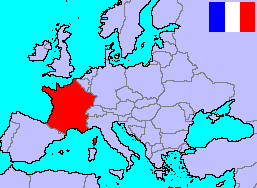

The Merovingians were a dynasty of Frankish kings who ruled a frequently fluctuating area in parts of present-day France and Germany from the 5th to the 8th century AD. They were sometimes referred to as the "long-haired kings" by contemporaries, for their symbolically unshorn hair (traditionally the tribal leader of the Franks wore their hair long, while the warriors were trimmed short).
The Merovingian dynasty owes its name to Merovech (sometimes Latinized as Meroveus or Merovius), leader of the Salian Franks from about 447 to 457, and emerges into wider history with the victories of Childeric I (reigned about 457 - 481) against the Visigoths, Saxons and Alamanni. Childeric's son Clovis I went on to unite most of Gaul north of the Loire around 486.
He won the Battle of Tolbiac against the Alamanni in 496, on which occasion he adopted his wife's Catholic faith, and decisively defeated the Visigothic kingdom of Toulouse in the Battle of VouillŽ in 507. On his death, Clovis partitioned his kingdom among his four sons, according to Frankish custom.
Over the next two centuries, this tradition would continue. Even when multiple Merovingian kings ruled, the kingdom - not unlike the late Roman Empire - was conceived of as a single realm ruled collectively by several kings and the turn of events could result in the reunification of the whole realm under a single king.
Leadership among the early Merovingians was based on mythical descent and alleged divine patronage, expressed in terms of continued military success. At the outset of Merovingian dynasty, the nobles banished Childeric, the father of Clovis, and acclaimed instead a Roman dux, Aegidius.
After Aegidius had been assassinated, Childeric was recalled from his retirement among the Thuringians (Gregory of Tours).
The Merovingian king was the master of the booty of war, both movable and in lands and their folk, and he was in charge of the redistribution of conquered wealth among the first of his followers. "When he died his property was divided equally among his heirs as though it were private property: the kingdom was a form of patrimony".
The kings appointed magnates to be comites or counts, charging them with defense, administration, and the judgement of disputes. This happened against the backdrop of the collapse of the centralized Roman system of administration and taxation and the disappearance of the old civil service structure, as the Franks took over administration from the Romans, gradually penetrating into thoroughly Romanized parts of the west and south of Gaul.
The counts had to provide armies; they enlisted them from their subordinates who were named knights and endowed with land in return for service. These armies were subject to the king's call for military support. The counts paid no money to the king, for there was little money in circulation. The king was expected to support himself with the products of his private domain, which was identical to the royal fisc.
Some scholars have attributed this to the Merovingians lacking a sense of res publica, but other historians have criticized this view as an oversimplification. The system developed in time to feudalism, and expectations of royal self-sufficiency lasted until the Hundred Years War.
Merovingian law was not universal law based on rational equity, generally applicable to all, as Roman law; it was applied to each man according to his origin: Ripuarian Franks were subject to their own Lex Ribuaria, codified at a late date (Beyerle and Buchner 1954), while the so-called "Salic Law" of the Salian clans, first tentatively codified in 511 (Rouche 1987 p 423) was invoked under medieval exigencies by the Capetians.
In this the Franks lagged behind the Burgundians and the Visigoths. In Merovingian times, law remained in the rote memorization of rachimburgs, who memorized all the precedents on which it was based, for Merovingian law did not admit of the concept of creating new law, only of maintaining tradition.
Nor did its Germanic traditions offer any code of civil law required of urbanized society, such as Justinian caused to be assembled and promulgated in the Eastern Empire. The few surviving Merovingian edicts are almost entirely concerned with settling divisions of estates among heirs.
Between 561 and 613, the various branches of the Merovingian house engaged in an intermittent and bloody war over the succession to the kingship, which ended with the family's effective rule notably diminished, though their increasingly token presence was required to legitimate any action.
During the 7th century, the kings ceased to wield effective political power and became more and more symbolic figures; they began to allot more and more day-to-day administration to a powerful official in their household called the maior domo or majordomo. This Latin title literally translates to the greater one of the house; the usual English translation is Mayor of the Palace. The office of Mayor of the Palace itself became hereditary in the Carolingian family.
Soon the Mayors were the real military and political leaders of the Frankish kingdom. This fact became manifest in 732 when an invading Moorish army from Spain was defeated by an army led not by the King Theoderic IV, but rather by the Mayor Charles Martel.
Charles's son, the Mayor Pippin III, gathered support among Frankish nobles for a change in dynasty. When the Pope appealed to him for assistance against the Lombards, Pippin insisted that the church sanction his coronation in exchange. In 751, Childeric III, the last Merovingian, was deposed. He was allowed to live, but his long hair was cut and he was sent to a monastery.
Merovingian Dynasty Wikipedia